www.bbc.co.uk
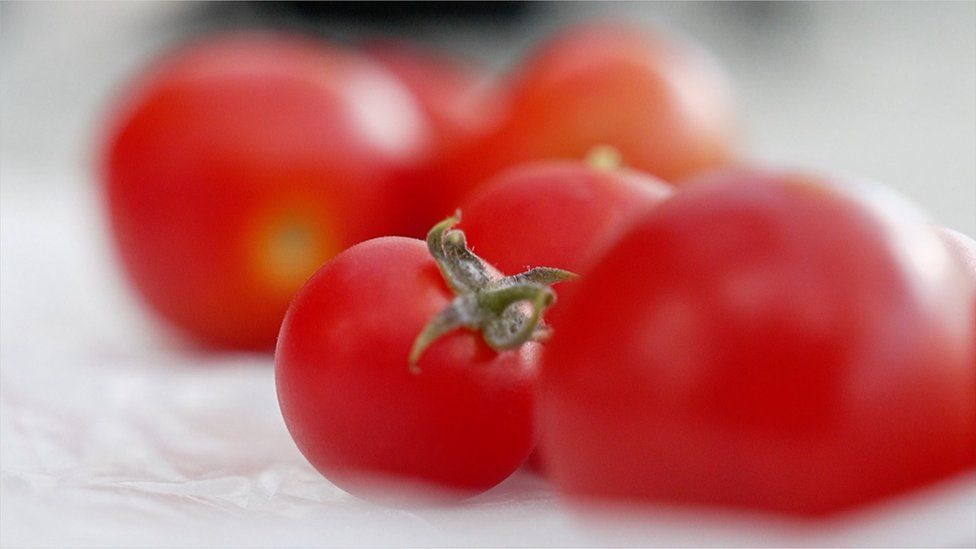 Image source, BBC News
Image source, BBC News
Image caption,
These gene-edited tomatoes with added vitamin D could be sold in supermarkets in England
The law in England has changed to allow gene-edited food to be made and sold - but what is gene-editing?
Well, gene editing is a process where scientists make specific changes to a plant or animal's DNA - the genetic code that makes us what we are - to achieve certain results.
This could be things like plants being more resistant to hot temperatures or diseases.
Supporters of the technology say it will help protect crops against climate change, whereas people who disagree with gene editing say it could potentially cause big problems for food production and the environment.
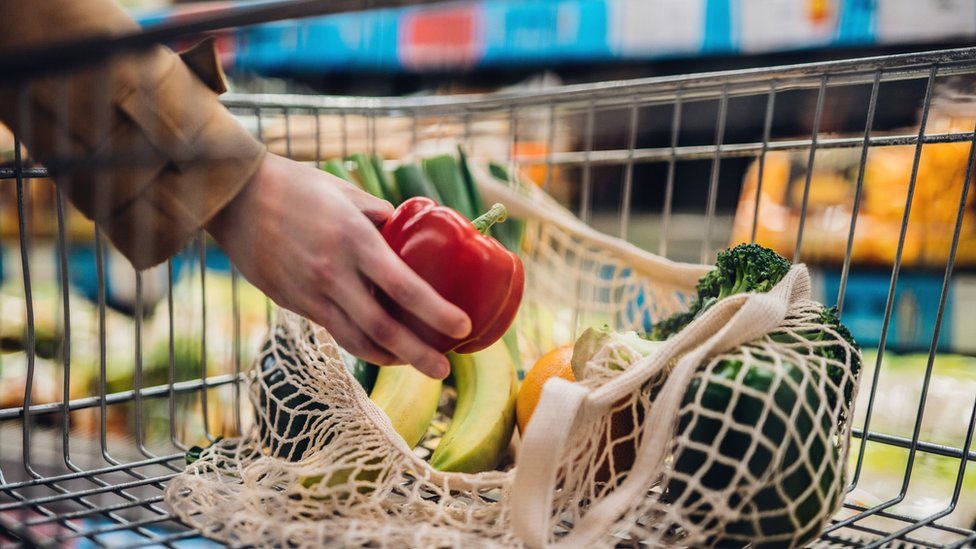 Image source, Getty Images
Image source, Getty Images
This new change to the law means that scientists and farmers can now make and sell fruits and vegetables in England that have been gene-edited.
The bill, called The Precision Breeding Act, only allow changes to be made to genes in plants and animals that could have happened naturally or through traditional farming methods.
So if you're at a supermarket in England a few years from now you may see some gene-edited vegetables on the shelves.
However, the Scottish, Welsh and Northern Irish governments voted to not allow the commercial use of gene editing.
What is DNA and how does it work?
DNA carries genetic information. It has the instructions a living thing needs to grow, reproduce and function.
DNA stands for deoxyribonucleic acid.
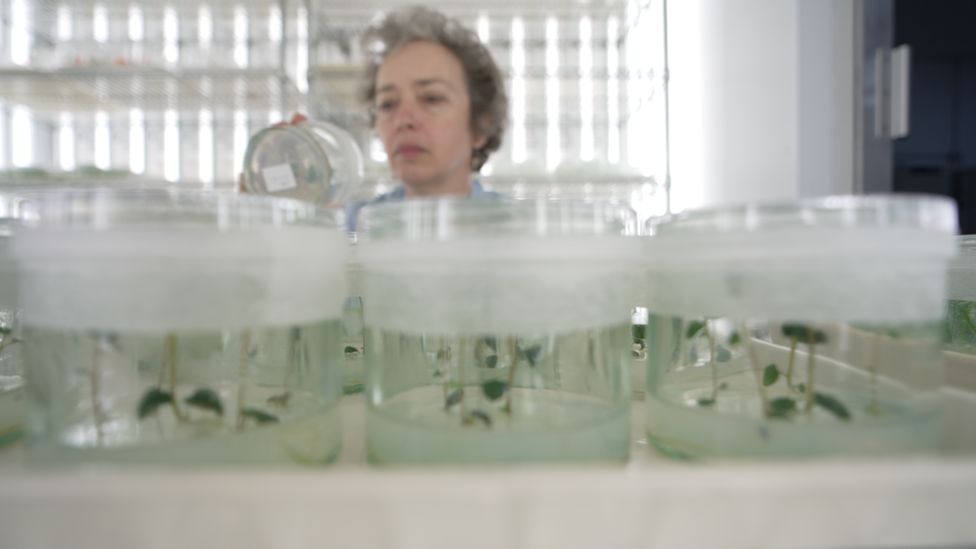 Image source, BBC News
Image source, BBC News
Image caption,
Researchers in Cambridge are developing gene-edited potatoes that don't bruise in order to reduce food waste
Gene editing, or GE, is a scientific process that allows researchers to make changes to a plant or animal's DNA.
This can be 'turning off/on' or 'snipping' bits out of the plant or animals DNA to do things like help it to grow faster, produce more fruit, or be more resistant to disease.
In the US for example they are trying to make blackberries and cherries that don't have seeds or stones in them.
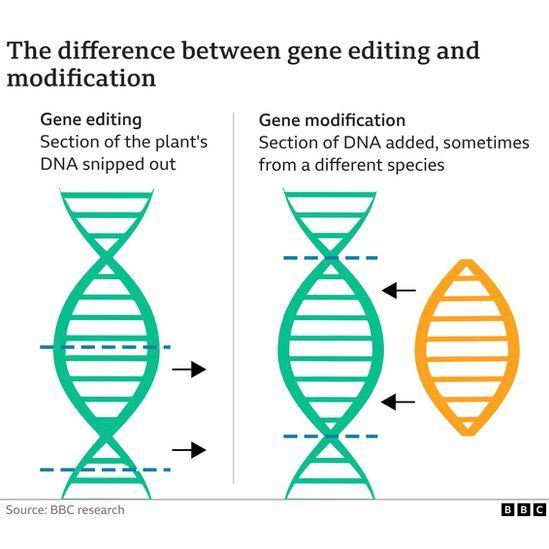 Gene editing is different to something called genetic modification - GM for short.
Gene editing is different to something called genetic modification - GM for short.
Genetic modification involves adding genes to a living thing's DNA from a different species.
It creates new types of plants and animals which could not have been created using natural methods.
GM will not be included in the new bill.
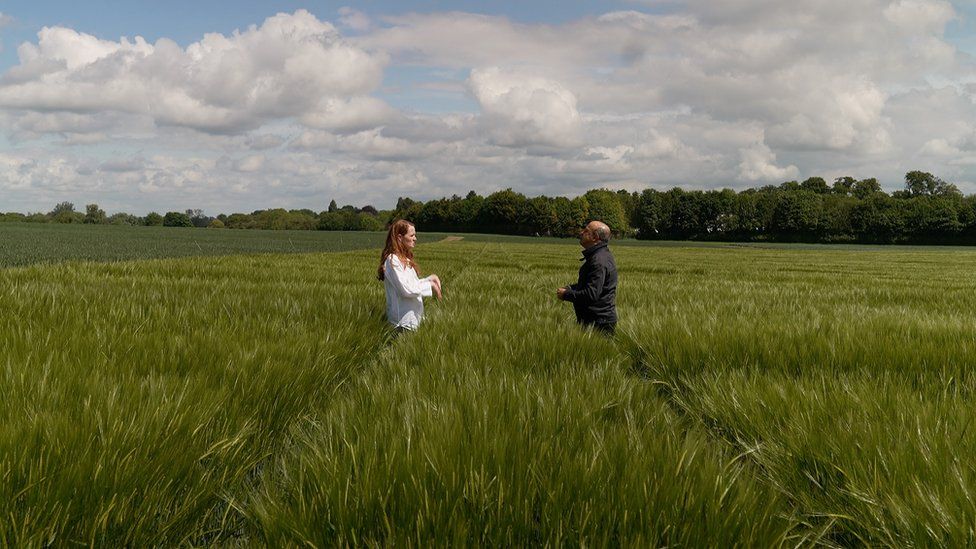 Image source, BBC News
Image source, BBC News
Image caption,
A new variety of barley being tested in Hertfordshire.
The chief scientific advisor for the Department for Environment, Food and Rural Affairs (Defra), Prof Gideon Henderson, says that the new rules could mean there is more better quality food produced and new job opportunities available.
"We can now use precision breeding technology developed in the lab and take it into the fields so that we can grow better crops and bring them to market more readily" he said.
According to Defra, the Food Standards Agency will only allow gene-edited fruit and vegetables to be sold if they are no risk to people's health.
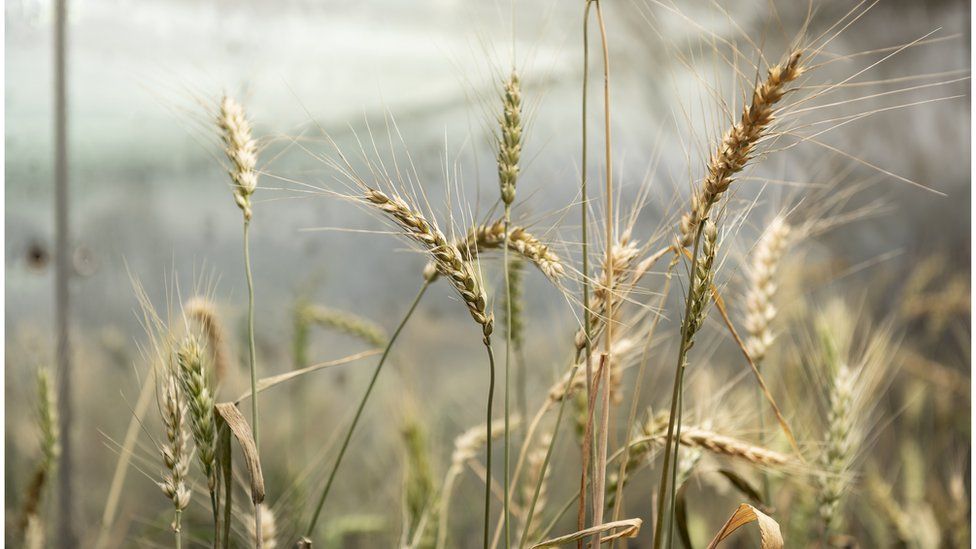 Image source, JIC
Image source, JIC
Image caption,
Wheat in Hertfordshire has been gene-edited to help boost crop yields
Some people are concerned that there won't be enough testing on gene-edited fruits and veg to make sure the foods are free of toxins or allergens.
There are also concerns about the possible effects that GE plants could have on our ecosystems because you are introducing a new plant into the balanced environment.
Currently there is no rule on this, meaning that gene-edited food from England could end up for sale in other parts of the UK, where it is still banned.
A Welsh Government spokesperson said that this would create "unavoidable consequences for Wales".
"Gene-edited plants, animals and products from England will be marketable here without the authorisations our law requires," they said.
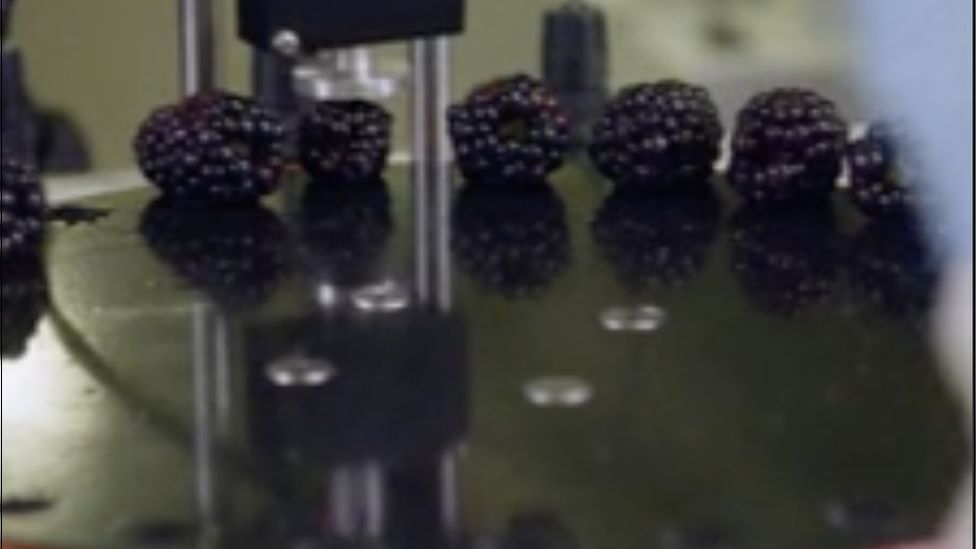 Image source, Pairwise
Image source, Pairwise
Image caption,
A US company is gene editing blackberries that don't have seeds
The Scottish government has long disagreed with genetic modification, however the National Farmers Union in Scotland say it could put Scottish farmers at a disadvantage.
The Northern Ireland government follows the strict rules on gene-editing and genetic modification which the European Union follows
The new law also means that gene-edited farm animals could possibly happen in the future, but another vote by MPs will be required before it is allowed in England.
https://www.bbc.co.uk/newsround/65062035
What is gene-edited food and what do the new rules in England mean?

Image caption,
These gene-edited tomatoes with added vitamin D could be sold in supermarkets in England
The law in England has changed to allow gene-edited food to be made and sold - but what is gene-editing?
Well, gene editing is a process where scientists make specific changes to a plant or animal's DNA - the genetic code that makes us what we are - to achieve certain results.
This could be things like plants being more resistant to hot temperatures or diseases.
Supporters of the technology say it will help protect crops against climate change, whereas people who disagree with gene editing say it could potentially cause big problems for food production and the environment.
How does the gene editing law affect food in the UK?

This new change to the law means that scientists and farmers can now make and sell fruits and vegetables in England that have been gene-edited.
The bill, called The Precision Breeding Act, only allow changes to be made to genes in plants and animals that could have happened naturally or through traditional farming methods.
So if you're at a supermarket in England a few years from now you may see some gene-edited vegetables on the shelves.
However, the Scottish, Welsh and Northern Irish governments voted to not allow the commercial use of gene editing.
What is DNA and how does it work?
DNA carries genetic information. It has the instructions a living thing needs to grow, reproduce and function.
DNA stands for deoxyribonucleic acid.
What is gene editing and how does it work?

Image caption,
Researchers in Cambridge are developing gene-edited potatoes that don't bruise in order to reduce food waste
Gene editing, or GE, is a scientific process that allows researchers to make changes to a plant or animal's DNA.
This can be 'turning off/on' or 'snipping' bits out of the plant or animals DNA to do things like help it to grow faster, produce more fruit, or be more resistant to disease.
In the US for example they are trying to make blackberries and cherries that don't have seeds or stones in them.
How is gene editing different from GM or genetically modified food?

Genetic modification involves adding genes to a living thing's DNA from a different species.
It creates new types of plants and animals which could not have been created using natural methods.
GM will not be included in the new bill.
Is gene editing food a good idea?

Image caption,
A new variety of barley being tested in Hertfordshire.
The chief scientific advisor for the Department for Environment, Food and Rural Affairs (Defra), Prof Gideon Henderson, says that the new rules could mean there is more better quality food produced and new job opportunities available.
"We can now use precision breeding technology developed in the lab and take it into the fields so that we can grow better crops and bring them to market more readily" he said.
According to Defra, the Food Standards Agency will only allow gene-edited fruit and vegetables to be sold if they are no risk to people's health.
Is gene editing food a bad idea?

Image caption,
Wheat in Hertfordshire has been gene-edited to help boost crop yields
Some people are concerned that there won't be enough testing on gene-edited fruits and veg to make sure the foods are free of toxins or allergens.
There are also concerns about the possible effects that GE plants could have on our ecosystems because you are introducing a new plant into the balanced environment.
What do Scotland, Wales and Northern Ireland think about GE foods?
Many people say that foods containing GE ingredients needs to be properly labelled so that customers know what they're eating.Currently there is no rule on this, meaning that gene-edited food from England could end up for sale in other parts of the UK, where it is still banned.
A Welsh Government spokesperson said that this would create "unavoidable consequences for Wales".
"Gene-edited plants, animals and products from England will be marketable here without the authorisations our law requires," they said.

Image caption,
A US company is gene editing blackberries that don't have seeds
The Scottish government has long disagreed with genetic modification, however the National Farmers Union in Scotland say it could put Scottish farmers at a disadvantage.
The Northern Ireland government follows the strict rules on gene-editing and genetic modification which the European Union follows
The new law also means that gene-edited farm animals could possibly happen in the future, but another vote by MPs will be required before it is allowed in England.
https://www.bbc.co.uk/newsround/65062035

